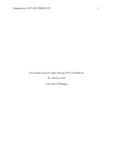| dc.contributor.author | Genlik, Ken Martin | |
| dc.date.accessioned | 2013-05-06T19:28:14Z | |
| dc.date.available | 2013-05-06T19:28:14Z | |
| dc.date.issued | 2013-05-06 | |
| dc.identifier.uri | http://hdl.handle.net/10680/439 | |
| dc.description.abstract | According to Whisman, Dixon and Johnason (1997) affairs/infidelity are the second most damaging problem that couples face and the third most difficult problem to treat. Glass & Wright (1988) argues that 30% of couples seek couple therapy because of infidelity during the course of treatment. Zola (2007) mentions that historically infidelity has been described as extramarital or extra-couple sexual relation that has been perceived as betrayal by a partner. In this paper I use infidelity in the sense that one of the couple has sexually or emotionally violated couple boundaries and bonds.
Infidelity is an attachment injury that might lead to trauma in couples secure adult attachment. EFT interventions are helpful because they may repair attachment injuries and help the couple to deal with negative emotional cycles that created infidelity. It also empowers couple’s positive interaction cycles. | en_US |
| dc.language.iso | en | en_US |
| dc.rights | info:eu-repo/semantics/openAccess | |
| dc.subject | Emotionally Focused Couples Therapy (EFT), Infidelity, attachment,attachment bonds | en_US |
| dc.title | Emotionally Focused Couples Therapy (EFT) and Infidelity | en_US |
| dc.type | Other | en_US |

